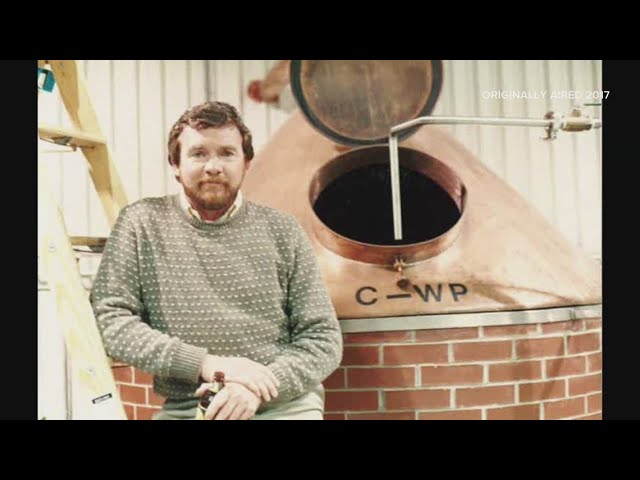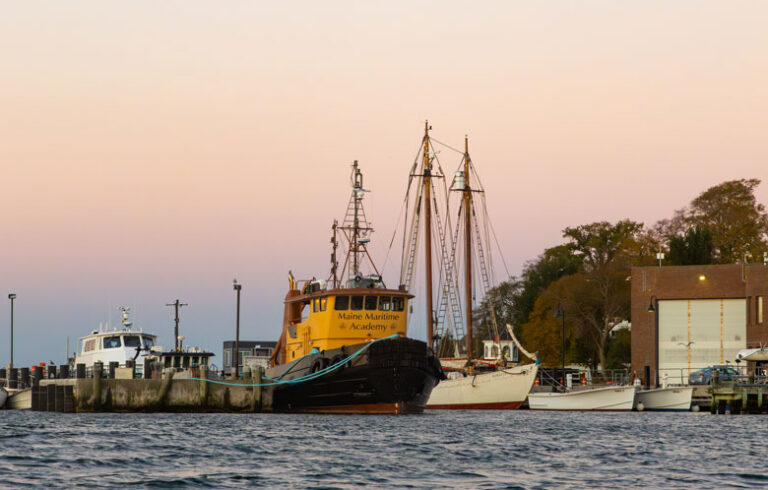The death of David Geary earlier this summer invites consideration of his contribution to craft beer in Maine. To understand his influence, it’s helpful to remember how dire the American beer scene used to be. In 1980, only about a hundred breweries existed, down from 750 in 1935. Nearly all of them brewed fizzy, yellow lager.
“You got to the point ten years ago,” Geary told the Evening Express in 1987, “where five breweries sold 95 percent of the beer in the country.”
DL Geary Brewing, New England’s first craft brewery, was conceived at $3 Dewey’s in Portland in 1981. Peter Maxwell Stuart, a Scottish Laird visiting to promote his Traquair House Ale, invited Geary, an aspiring brewer, to visit Traquair. David and Karen Geary incorporated their company in 1983, and Geary finally accepted Stuart’s invitation in 1984.
The earliest extant menu shows that a pint cost $2.75, 25 cents more than Portland Lager…
While Karen cobbled together small investments to raise $300,000 in start-up capital, David visited Traquair House to learn the basics. From there, he toured several other British breweries, most notably Peter Austin’s Ringwood Brewery in Hampshire, England.
Under Austin, he studied commercial brewing in earnest. He also enlisted Austin’s associate, Alan Pugsley, to travel with him to the U.S. to install the brewhouse.
In 1985, the Gearys began construction in Portland’s Evergreen Industrial Park. The location proved auspicious, as ten other brewing companies have since begun in the neighborhood. Maine’s largest brewery, Allagash, may be the most famous, but Maine Beer Company, Bissell Brothers Brewing, and Rising Tide Brewing all started there, outgrew their space, and moved into larger facilities.
Four others remain in this brewery incubator: Foundation, Austin Street, Battery Steele, and Definitive.
On Dec. 10, 1986, the first pint of Geary’s Pale Ale was poured, again at Dewey’s. The earliest extant menu shows that a pint cost $2.75, 25 cents more than Portland Lager, which had beaten Geary to the market by a few months. Few people remember that brand, which Maine Coast Brewing contract-brewed in Wisconsin and New York. Maine Coast’s plan for a microbrewery in the Worumbo Mill in Lisbon Falls literally went up in smoke in July 1987 when the mill complex burned down.
Although it’s a footnote in craft beer history, Portland Lager illustrates two points. First, it followed the pattern set by Jim Koch’s Boston Beer Company by introducing a lager, while Geary brewed an ale. Lager was far more popular back then, as it is today.
By leading with a pale ale, Geary’s risks were somewhat greater, but his beer was more distinctive. Second, Geary was actually brewing, kegging, and bottling his own beer. Maine Coast Brewing sadly never got a chance to do that, and the Boston Beer Company would not have its own brewery in Boston until 1989.
Unlike many pioneering craft brewers, Geary did not disparage contract brewers like Boston Beer Company. In a keynote address at the Great American Beer Festival in Colorado, he scolded fellow brewers for criticizing Jim Koch, reminding them that Koch had carved out a market for them.
Eventually, Geary’s company would become a contract brewer for other brands, like Belfast Bay Brewing, which the DL Geary Brewing recently purchased.
Craft beer would have come to Maine with or without Geary. Harpoon in Massachusetts and Catamount in Vermont went on tap in 1987. In 1988, Gritty McDuff’s became Maine’s first brewpub, and in 1990, Bar Harbor Brewing sold its first pint at the Lompoc Cafe.
Yet David Geary’s success fundamentally shaped craft beer, not just in Maine, but regionally and even nationally. By recruiting Pugsley to install his brewery, he established the malty, English ales as the defining regional style.
Pugsley later installed more than 80 other breweries and trained generations of brewers. He was a partner at Shipyard Brewing, the 46th largest craft brewery. Most recently, Puglsey has been working with Orange Bike Brewing, which will soon release a line of gluten-free beers.
Geary’s influence can even be found in the history of Allagash Brewing, Maine’s largest brewery. Founder Rob Tod learned to brew in Vermont, but was drawn to Portland by its vibrant beer culture. Recognizing the dominance of English-style ales, he opted to brew Belgian-style ales to set himself apart. Allagash is now the 20th largest craft brewery in the U.S.
The Maine Brewers Guild estimates that craft beer contributes around $250 million to the Maine economy, more than the potato industry. More than 160 Maine breweries employ more than 1,600 workers.
Beer still falls far short of the lobster industry’s impact, so the lobster on the Geary’s Pale Ale label might be an homage to Maine’s traditions, but also expresses an aspiration for prosperity.
Tom Major writes about beer and other subjects for the Portland-based publication The Bollard. A version of this essay appeared in The Bollard earlier this summer.





